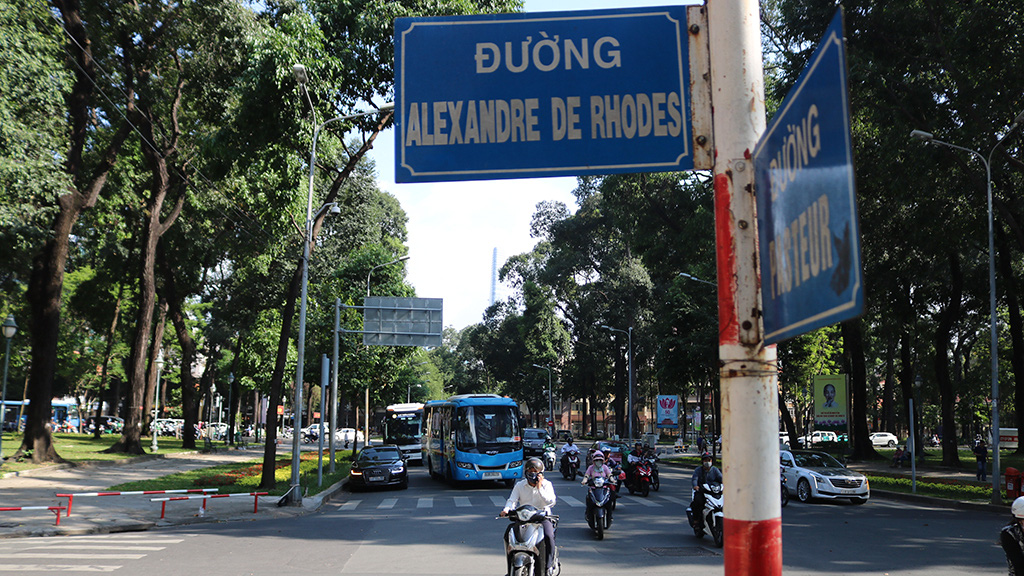Shakespeare stared this one in the face (twice) and concluded that a name doesn’t include the total of your essence – your personality, beliefs, and, most of all, what you believe yourself to be despite the name-calling, labeling and verbal abuse you might get from others – you are you and the best you will be ever (thanks, Dr. Seuss).
A small bun-fight has broken out among Vietnamese scholars (usually called ‘experts’ these days) over the possible naming of streets after the two foreigners - Francisco de Pina and later Alexandre de Rhodes – both of whom devised the Romanized Vietnamese language that we all take for granted these days and made it much less of a nightmare to look up Vietnamese words in a dictionary...or deal with the friendly Vietnamese shopkeeper around the corner.
The objection revolves around the notion that they somehow contributed to the French occupation of Indochina. Since this was the 1600’s, I can’t see how they could be the bad guys in all this kerfuffle.
The argument centers on the idea that such street naming should be reserved for significant contributions by Vietnamese either by their heroic deeds in defending the country, or cultural advancements that helped Vietnamese grow intellectually and culturally.
A good example of this would be ‘Phan Chu Trinh,’ an intellectual and educator in the early part of the 20th century. He’s everywhere on signposts from the north to the south and had hundreds of schools named after him and at least one university in Hoi An a few years ago.
However, it does add to confusion when the Vietnamese label stuff the same in every town, hamlet and alleyway in Ho Chi Minh City with the same list of people. I can imagine the exasperation of map makers moaning ‘Oh, God, not Tran Hung Dao again.'
Now I have no problem with this. In the Western world, we have thousands of examples of streets, parks, and mountains – well, heck, just about anything that wasn’t nailed down – in the thought, promising to remember those that people think changed or added something to the world.
Mind you, I think it’s intriguing that we are far more eager to name our landmarks and institutions after the names of warriors rather than the much more peaceful folks. Or even those people of any race or culture who truly changed our world.
There are not too many ‘Einstein’ streets, are there? Nor for that matter ‘Gandhi’ or ‘Mother Theresa’ roadways or law courts; maybe we don’t want to give people false hope? Perhaps in the Western world, we have ‘Hawking Avenue' or ‘Beethoven Lane' yet they don’t really stick in our minds, hey?
Maybe a good way to honor the current super achievers in Vietnam could possibly be to have streets named after them. There are heaps of scientists, doctors and football players you could embarrass by plastering their names to strange structures or use their nom de plume (pen names) to heighten local awareness of their national heroes.
Or name things after well-known cultural aspects of Vietnam such as ‘Ao Dai’ street or ‘Non La’ (conical hat) promenade. I think it’d be pretty cool to have a ‘Larue’ highway or a ‘Tiger’ bridge. Yeah, I know we have a ‘Dragon’ bridge in Da Nang but come on…
Also, since there are hundreds of ‘Sleepy Gecko’ bars and hotels – why not ‘Cho’ (dog) park or ‘Heo’ (pig) exercise gyms? But I guess ‘Meo (Cat) Mountain’ might be taking the idea a little bit too far.
It would be super cool to use the Vietnamese language and labels in a more memorable manner when you think about it a little bit also; ‘Summer' (mua he) Street or ‘Sugarcane’ (nuoc mia) Crescent comes to mind along with ‘Pho Plaza’ or ‘Banh Mi Terrace.'
Excluding some foreigners from being immortalized in Vietnam with a plaque and a permanent place name on Google seems unreasonable to me.
Louis Pasteur, the guy famous for establishing the principles of vaccination and pasteurization got his young partner Albert Calmette to set up an institution in Saigon which went on to do invaluable work for the Vietnamese people – I don’t see him being excluded from permanent sidewalk street fame; so why object to the two foreigners who made it easier to use Vietnamese in countless situations and rendered the official language that much faster to learn?
It’s not unusual to visit international cities that boast a cosmopolitan atmosphere and lifestyle – which I feel Da Nang is fast becoming – and encounter street and landmark names from dozens of languages. Given that the average tourist and local hardly look up from their smart- (cough) -phones to actually read street names anymore, I say, plaster those names!

















































